His road to success was tough. At the early stage of his career, a Lagos landlord gave him a quit notice due to his inability to pay office rent. He never gave up. Instead, he used his God’s-given talent, his voice, to realise money and pay his rent. That is the story of Issac Onyemaechi Moses, the Chief Executive Officer and Co-Founder of Goge Africa, who says he can’t do anything without his amazing wife, Nneka. Charles Ajunwa brings the excerpts:
C
an you tell us more about growing up?
It was quite exciting growing up. I grew up in the North, in Zaria, Kaduna State. That is the reason I am able to speak Hausa. My primary school was in Zaria, and I went to Boys’ High School, Nebo in Awka, Anambra State. Then went back to Zaria, where I attended Ahmedu Bello University. I studied Insurance. So, growing up, I was shuttling between Zaria, Kaduna State, and Anambra State. Eventually, after school, I came to Lagos. Initially, people would tell me, ‘you sound like a radio man, you have a great voice and all that.’ I tried getting a job with an insurance company, but the places I tried looking for jobs, they told me, ‘look, we don’t have any job for you, but if you go to a radio station, I’m sure they would grant you listening ears.’ I said, really, I felt they were just being nice, just to tell me off, you know, nicely.
Coming from the Southern part of the country and your schooling in the North. What was the experience?
Then in the 80s, honestly, there was no issue of being afraid of your neighbour, or being skeptical. For instance, my friends, they were Muslims, because the North was predominantly Muslims. We grew up together, my friends up to today, I mean my childhood friends. So my friends were from the North. There was this trust. During Christmas, my parents would cook and share with our neighbours and during Sallah, the Eid festival, they would cook and share with us Christians. And we had that camaraderie, that friendly, peaceful relationship. We would go to Zaire City for the Darbar. Honestly, it was fun growing up. We go to the cinema, your friends, whoever had funds, would pay for the other. It’s lately, say, the last 10 years that I began to, like, wonder, is it not the same North that I know? All the things I’m hearing, when did these all start? But you just never know. Maybe people change overnight, but honestly, growing up, I will tell you, I didn’t have any issues in the North. That’s why I speak fluent Hausa, and to most people, I don’t look like I can speak Hausa, but each time I need to speak Hausa, when I speak. They wonder and say, ah, your Hausa is still good. I used to even think that it’s becoming not as good as it used to be because of living in Lagos for the past 25, 30 years. Honestly, my best friends are still from the North.
Were you a brilliant or average student?
Well, I was a very easy-going guy. I wouldn’t call myself an exceptionally brilliant student, but I wasn’t bad. I mean, I wouldn’t say I’m dumb.
Back then, I recall one very incident. There’s this lecturer who takes us on the course, ‘element of insurance,’ He would not do a lot of teaching. He just prints handouts. While some students could afford it, some could not afford the handouts, so we normally share handouts among ourselves. So, the guy would come during his lecture, and he would say, ‘you, Mr. Moses with a big voice, read the handouts.’ So, he would pause me and explain the verse or chapter that I had read. And some people would say, O boy, you better go look for a job for NTA.’ You know, stuffs like that. It was like a joke, but nobody took it seriously. But growing up down the line, after I’ve become a fully grown man, I noticed that my voice has even got more noticeable. Anywhere I spoke, somebody would say, ‘you have a good voice.’ So, I went to meet a band called Ray Mike Nwachukwu. Ray Mike Nwachukwu was the original artiste of ‘Time Na Money, oh, Time Na Money’. Before Mike Okri did it. When I met Nwachukwu, he told me I have a great voice, but that I needed to learn to use it.Coming from an elderly guy like that, who was then a seasoned voice artiste, singer, producer, and BBC-trained. I was quite humbled that he felt I had a good voice. For the first time, I took it seriously. So, he invited me to his studio, RM Studios on Ogunlana Drive in Lagos and he gave me an audition. He said he liked the sound of my voice and If tutored properly, I could become great. One day he invited me and told me to read more to myself and that I should criticise myself for me to succeed. So, he gave me some of his show reels to listen to on a cassette and when I played them, I heard some of the works he had done and I was thrilled, like Joy Soap jingles; ‘Don’t let feverish conditions get you down,’ for Enzo paracetamol’. He sang it, and then he did the voice. My chest used to beat each time I’m given a script. But gradually I kept reading and overcame that challenge. After learning some of those things he taught me, I eventually joined Voice Over Associations of Nigeria, where right now Segun Arinze is the president. And we have some great ads there. I had been privileged to work with people like Tony St. Iyke of blessed memory. I’ve worked with Femi Showolu, Bukola Makinde and the late Isaac Ijeoma. A lot of great guys. So, it was a money-making industry that wasn’t that popular. People just heard a voice on the radio, they think it’s on the radio station, not knowing that it was produced outside and booked on air on different radio stations. Before I got married, the clients I used to work for, like Nigerian Breweries and some more, I used to do voice work on their brands. They supplied me with Gulder, Star, Maltina and others. There was a time I used to be the voice man on Maltina, and all that. These guys appreciate the good work we’ve done for them in the past. And they supported my wedding with lots of beverages, thanks to them. That’s my background.
Between your mum and dad who influenced you the most?
My mother is Igala. My dad is Igbo. And my mother would speak to me in Igala language; my dad in Igbo; at school, they would speak English; on the streets of Zaria, they would speak Hausa. Then I came to Lagos, everybody speaks Yoruba and English and Pidgin. I caught on! So, the thing is, both my parents had a lot of influence on me, because my mother would tell me that, look, each time we put our foot wrong, our father would come back and blame her. So, because we do not want my mother getting into problems with my dad, we always try to do right by her. So, you knew not to come back late for dinner. Because when everybody’s eating, my dad would ensure, he would say, ‘look, if you don’t eat when everybody else is eating, every time they’ll keep your food separate. Eventually, everybody would know that the food that’s always left behind belongs to you. If they wish to poison it, they know where to get you. Always eat when everybody else is eating. Don’t come back later and expect your food to be waiting.’ My dad was a strong disciplinarian. He was a man of hard fact and business. He was a civil servant, working with the Federal Ministry of Works and Housing. He would tell you that, ‘look, a good name is better than riches.’ The day I sent my dad N60,000 from Lagos. He got on a night bus and came to Lagos. He said, ‘bia ebee ka isi nweta ego (come, where did you get the money from?). Have you joined a bad gang? Are you trying to impress me or what? You don’t have to.’ I said, ‘is N60,000 too much for me to have? I said, look, I do this, I do that.’
I used to host events. I used to do voiceovers. I do a lot of stuff. Showbiz personality, well-rounded showbiz man. They would call me to come and host events. I even acted. In the early stages of Nollywood, I acted in Bruno and the Law, Love In Vendetta, To Live Again with Amaka Igwe production. And I told my dad that, look, anam ezu ori (I don’t steal). I’m not with a bad gang. The things I do are not something you can easily see. So my dad became more reassured that nwa ya anori ndi ojoo (I’m not with a bad gang), Odighi ezo ori ( he doesn’t steal), from Odighi eme Yahu Yahu (he doesn’t do Yahoo Yahoo). You see, because then, growing up again, when I came on holiday, my grandmother, I noticed as a kid that people back then had trust. They had respect for each other. Nobody would steal because they know… just looking at your face, they know which family you came from. Even when you see someone in the village who is not your uncle or your cousin, but the fact that he’s an elder, you know that he knows you. So if you’re doing a bad thing, you will stop because anybody can discipline you. But these days, it’s not like that. That’s why the way we grew up, it wasn’t my dad alone, or my mum that raised me. My uncles, my senior cousins, you know, anybody would discipline you if you don’t behave well. And when you did well in school, after WAEC, my results were resounding. When my dad heard his son was doing well, everybody was happy. So when you do well, the community is happy and proud of you. And then if you do bad, you also stain the image and the name of your family and the community. That’s how I was raised, and I still keep that virtue. I still maintain those principles.
My kids, I try to let them understand, look, you’re lucky that your dad or parents can afford basic things. You didn’t have to go to the stream to fetch water like I did. You didn’t have to walk to school through narrow paths. Now, they drop in school and come back to pick you up. The child get used to the soft life. Nowadays, most people would not let their kids walk to school all by themselves for fear of the unknown. I’ve been in Lagos, and my parents are not in Lagos. For as long as I’ve been in Lagos. I would say, to the glory of God, I’ve done well. And those principles have seen me through adulthood.
Are you a strong or weak guy?
Well, let me say, I’m a very easy going guy. You know, it’s just that I have my principles and I like to insist on things done right, done properly. And you have to also understand that the way I was brought up is different from the way a lot of people were brought up. So if I see people who share the same values and virtues as I do, I flow with them. If I notice that you don’t, well, no problem. At least, I give you a gap. But I’m a very friendly person and my friends will say that of me, you know. My friends call on me, I answer them. When I call them, they answer me. And I fear God. I don’t know how, I think I’m not the right person to answer that question. Other people would be the ones to answer that for me. If I say, am I tough? I wouldn’t know. But I just know I’m a firm person.
What particular life-threatening experience scared you the most in life?
It’s not just one because I fly a lot, through water, by air. I’d been on a flight, my wife and we were the only black people in the plane. And this turbulence was bad. Even the white people on the flight with us who would not speak to us for obvious reasons. Suddenly, I didn’t know they could speak English. Somebody said, are we going to die? And I started laughing. I said, people who refused to talk to us, suddenly, they are seeing death, staring at them. They are now asking. So,that was a scary experience.
Another time was in Ethiopia. We were in a boat. We visited a monastery. And coming back, the turbulence in the water was bad. They warned us to make sure we left before 6p.m, but unfortunately, we got carried away in our job and we were leaving late. And then it started raining. Thunder, lightning, holy Moses! The captain lost his bearings. Suddenly, it slammed us into the water. Water was coming into the boat. It was really bad. I said, okay, me, my crew, my wife, and even my son was in the boat. I said, men, this is bad. So, as luck would have it, my pastor, Prophet T.B. Joshua, now late, gave me holy water. I brought it out and used it.
Do you have a particular experience?
Yeah. When we started Goge, money wasn’t coming in for like three years. No income. We just put in what we had. And we just enjoyed doing what we were doing. Forgetting that this thing needs to be monetised. This thing needs to pay the bill. But it wasn’t paying the bill.
And then the advertising agencies were not advertising on the show. Then it was time to pay rent. One of the studios that we were editing, because we were not paying the studio, threatened to withhold the master of Goge if we didn’t pay. My landlord has written a letter that we should quit because we don’t want to pay rent. Then, to the glory of God, African Magic, that’s Multi-Choice, said they wanted 13 episodes of Goge Africa. And paid N760,000 naira. That was a lot of money then. Talking about early 2000. So, wow, we used that, paid the landlord, paid the studio. And just barely enough to buy tapes for the programme and all that. So that was quite a scary experience.
Goge Africa, where did you get the inspiration from?
Formerly, like I said, I never told you this. I used to run a radio, that same Raymond Nwachukwu got me to present a radio show for him. And he was doing good. I like to play African music. But they wouldn’t let me play African music because I knew friends like Segun Arinze, Healing Child, Zaki Azay. I used to be a manager of these musicians. And I can’t play their music on my show because the producer felt if I played African music, the rating of the show would drop. So, it was all the hip-hops, rap music and all that.
So, at one point, I said, I’m not going to continue this programme. I want to do a programme where I can control what goes in and what does not come in. I want to be in control. I decided that I was going to start a programme and do something that I would own. I told my wife. Then she was just my girlfriend.
So, I decided to do Goge Africa and she encouraged me to start the television programme with her.
She said, okay, she’s going to be bringing her costume because she was making costumes, selling clothes for people who make films who come and rent costumes from her. So, she said she would dress me in African clothes so that we can also help our business grow. I said, oh, fine. It will be really Afrocentric. We started, gradually, like that we started also promoting other African designers like Frank Oshodi, who makes clothes for us, Nalem from Ghana who sells clothes. From South Africa, you have Sister Box, you have A-Farm Couture who makes clothes for us. You have Modela Couture who makes clothes for us. So, before you know it, African designers started picking up, people started seeing nice clothes we wear on the show. Before you know it, we started having bata complimentary tickets from airlines to be promoted on the show like that. When the programme grew, brands like MTN came on board, and started working with MTN. Then different advertising agencies started bringing their brands on the show. So, in that way, the programme became a global thing. Right now, we’re just chatting with people from Cape Verde who want us to come. Last two months, we came back from the Gambia, promoting destinations. (26:31) Because an African platform like Goge Africa had taken its time to grow. Now, we’re in Accra, Ghana, covering 2025 Accra Weizo, a tourism conference organised by a Nigerian, Ambassador Ikechi Uko. And Africans have seen that if we don’t talk about our programme, our culture, our tourism, nobody will speak for us. We have to tell our own stories so that we can own the narrative. Otherwise, other people will tell the story for you and tell it from their own perspective.
That’s why Goge Africa, honestly, has come to stay. And now, is it the music? I started promoting African music before any other programme. For me, any music I played on Goge Africa I had met the artiste. Artists like Brenda Fassi, Ringo Madlingozi from South Africa. Of course, Nigeria is countless. When artistes would bring their CDs and videos for me to play, I never took money from them. So your music is good, if it’s good, I’ll play it. If it’s not good, you will not play it. you know. Before I stopped playing music and started to promote destinations, the culture, because the culture wasn’t getting airplay. It was the music more. I said, okay, let’s do the culture. The New Year Festivals, the Ikeji, the Mmanwu Festivals, the Ojede Oba, the Ofala, other brands and then associating with those festivals. You see, as we kept promoting these festivals, even Globacom would come and take over a festival that others used to pay more money and take it over. Because we grew the equity of these cultural festivals and the whole idea is that Africa we need to throw the spotlight more on what we have. And when that happens, you will see our Western counterparts will come here and respect what we have and spend good money in our country, in our continent to experience it. And that’s why I’m always happy when any country calls Goge Africa to come and help promote the destination. Honestly, I do it with all pleasure.
You and your wife behave like Romeo and Juliet. You do everything together. What attracted you to her?
My wife understands me more than anybody else. She’s beautiful. She’s brilliant. And she’s respectful. You know, as men, there is nothing we crave like respect. You want to be sure that your wife has got your back. Your wife would not disgrace you. You know, so that’s me. And I grew to know her more and more. We work together, we live together, we travel together. I mean, what I forget, she remembers. What I cannot do, she does. In the places where I’m weak, she’s strong. Places where she’s weak, I’m strong. So that way, we complement each other and we flow. I’m happy and I thank God.
How have you been coping with the home front, especially the kids?
When we travel we put them in the boarding house. Sometimes relatives would come and stay with them. They understand that mummy and Daddy have to do what they do to put food on the table and pay school fees. And these days, school fees for children nobi small. We do what we need to do and the kids appreciate it.
If you’re dropped in the desert, what three things would you look at?
I will look for an oasis, because an oasis will give me more proximity to life. Then I will look around and see if I find shelter before I begin to consider food.
What is your projection for Goge Africa in the next 10 years?
We will be doing lots of stuff aside from Goge Africa, like training for the upcoming young ones as successors to carry on the baton. Bringing more people into the business of promoting culture and tourism. And also I believe that the world will see more of the beauty of Africa through Goge Africa.
Do you feel fulfilled so far?
Honestly, I feel very fulfilled because I see that Africans, especially Nigerians now look inwards. Because the content in Africa is inexhaustible, is it from our food? Is it from the destinations? Is it from the music which is ruling the world now? Is it from our fashion? I mean, so you see that internally we have good stuff and like the fact that Goge Africa has opened their eyes to the riches and wealth of Africa. Everybody is looking inwards now. Formerly, it used to be that if you don’t go to Europe or America you will not enjoy tourism. No. Africa has beautiful destinations that we can spend our money on and be fulfilled. Look at the smiling coasts of Africa. Look at Nigeria – the Obudu, the Ikogosi, the Yankari Games Reserves, the Bichi Warm Springs in Bauchi, we have lots of beautiful places. Even in Ghana here, look at The Royal Senchi Hotel and Resort in Akosombo. So, Africa is rich, Africa is blessed and we Africans as soon as we realized that the better for us.



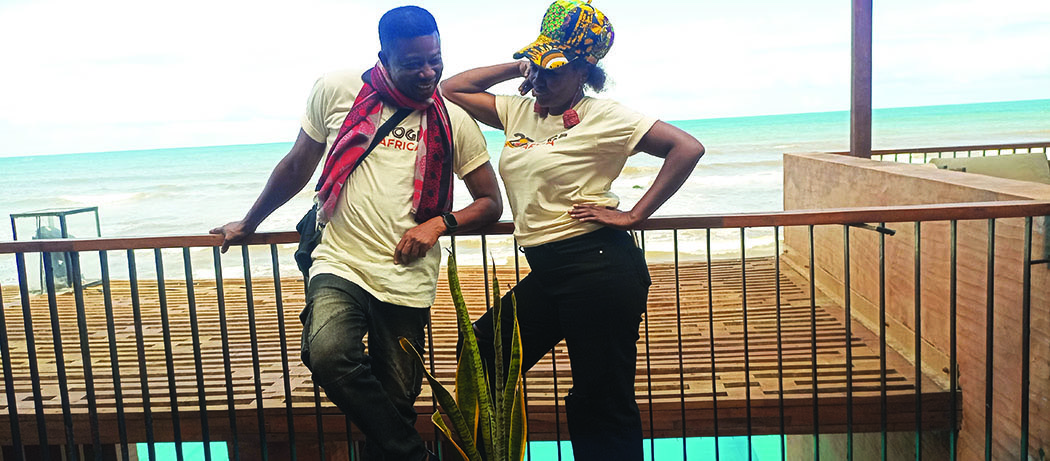


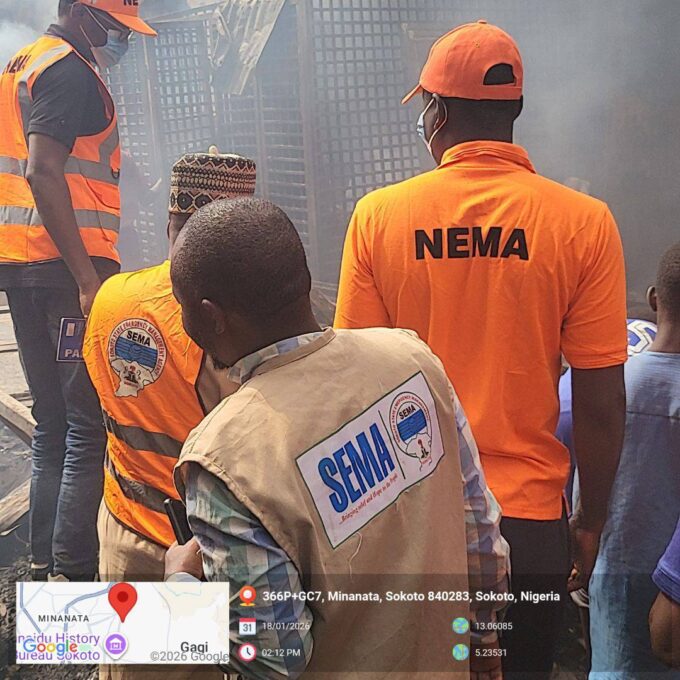
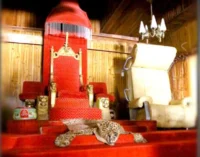
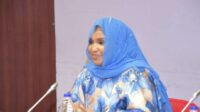
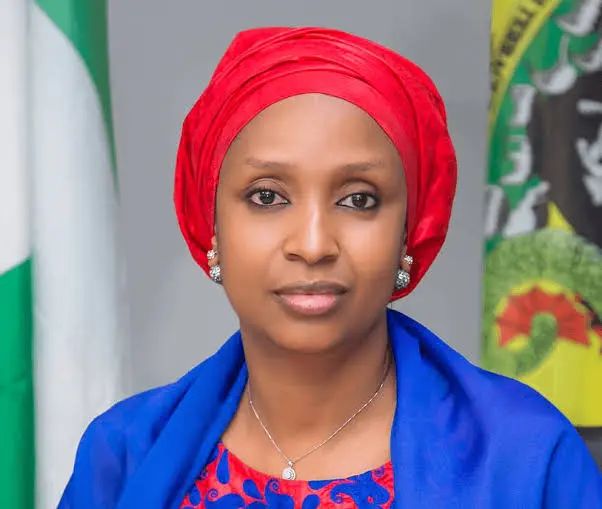
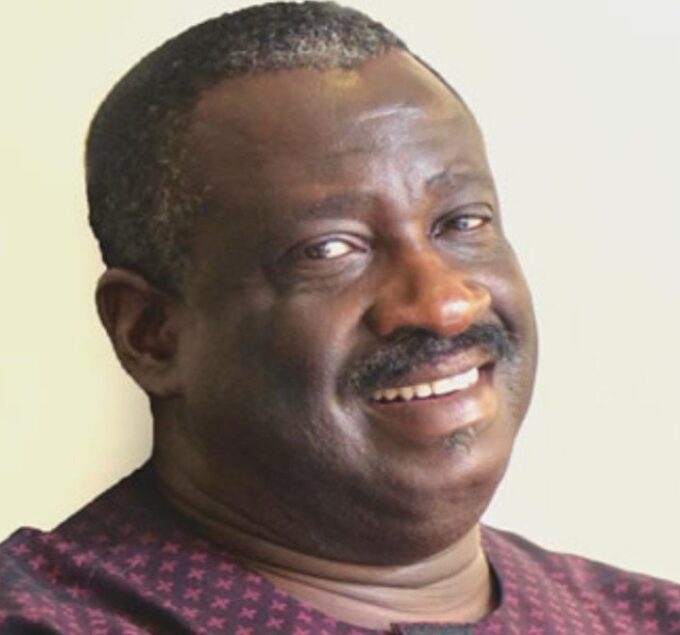




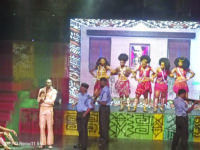
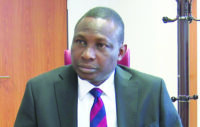
Leave a comment